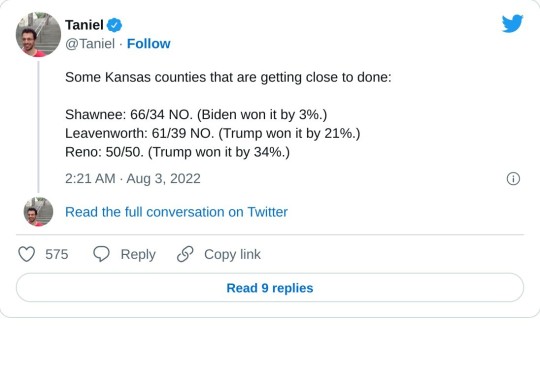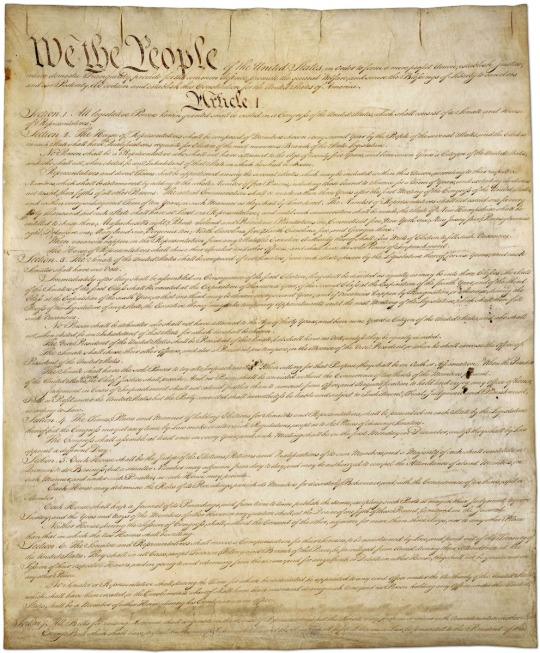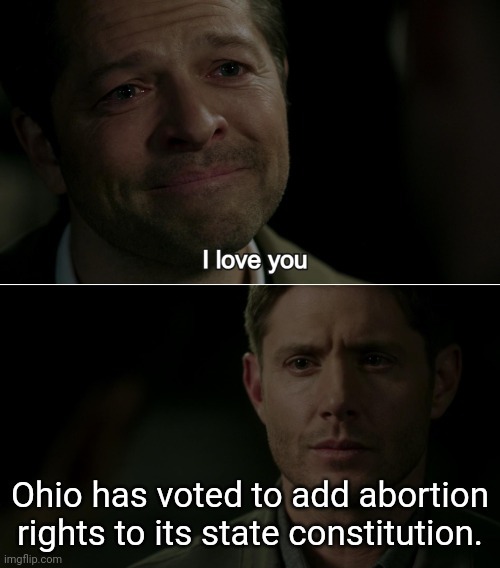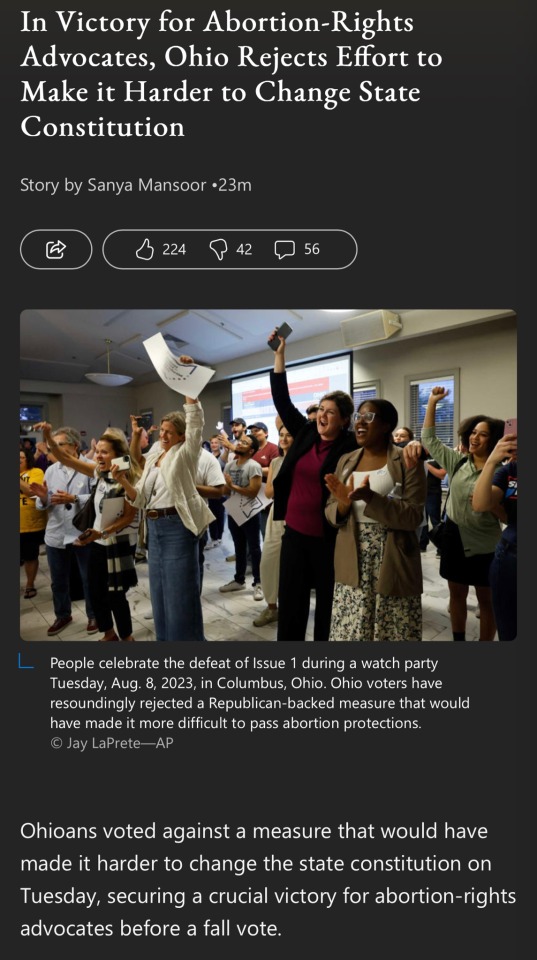#state constitution
Text
Reproductive freedom will likely be on the ballot in Nevada this November.
The Nevada Supreme Court overturned a lower court ruling and issued a decision saying that such a measure has the right to be voted on as an amendment to the Nevada constitution.
Nevada already protects abortion through the first 24 weeks of pregnancy. Putting that right in the state constitution will further solidify that right.
The Nevada Supreme Court has ruled in favor of granting ballot access to a broad “reproductive freedom” ballot question seeking to enshrine rights to a wide range of birth control, fertility and abortion options into the state Constitution — though the group supporting the initiative is already moving forward with a proposal more narrowly tailored to abortion access.
The 16-page decision released Thursday overturned a lower court’s ruling that said inclusion of topics such as prenatal care, abortions, vasectomies and infertility care under the umbrella of “reproductive rights” within a single ballot question was unconstitutional because the framing was too broad.
“[A]ll the medical procedures considered in the initiative petition concern reproduction. To assert that they could not all be addressed together because they are separate procedures is improper,” read the opinion, which was signed by six of seven justices on the court. Justice Patricia Lee recused herself from the case because of a professional conflict of interest.
But the ruling will likely not affect the petition’s chances of landing on the November ballot, as the group supporting it — Nevadans for Reproductive Freedom — has said it intends to prioritize collecting signatures on a narrower petition that focuses only on abortion rights.
The high court will also rule on the constitutionality of that proposal — which received approval from a lower court judge in January — though Thursday’s opinion indicates that it is almost sure to pass legal muster from the state’s high court.
Like Nevada, New York and Maryland already protect the right to abortion. They too will hold referendums this autumn to place that right in their state constitutions.
Florida is poor on reproductive freedom and is set to get worse; but the passage of Florida Amendment 4 in November could fully restore reproductive freedom in the state now under the repressive rule of Ron DeSantis and his gerrymandered legislative supermajority.
Thanks to the Republican US Supreme Court's overturning of Roe v. Wade in 2022, it's now up to the states to protect reproductive freedom. Placing that right in state constitutions is the highest level of legal protection available.
#nevada#abortion#reproductive freedom#reproductive freedom amendment#nevada supreme court#a woman's right to choose#state constitution#abortion referendums#new york#maryland#florida#florida amendment 4#roe v. wade#restore roe#election 2024#vote blue no matter who
12 notes
·
View notes
Text
Kansas voters turned out in droves to reject the first anti-abortion ballot measure in the post-Roe v. Wade era — and dealt a major warning sign to Republicans hoping the drastic curtailing of abortion rights nationwide won't dent their prospects in the 2022 midterm elections.
Amendment 2 was pushed by anti-abortion activists and would have eliminated the right to abortion and government funding for abortion under the Kansas Constitution. With over 900,000 votes counted as of 11:30 a.m. ET Wednesday, "no" was trouncing "yes" by 59 to 41%, a gaping 18-point margin.

The blowout defeat of the measure spells trouble for future anti-abortion ballot measures, two of which are up for a vote in November in Kentucky and Montana, and, more significantly, Republicans' hopes for muted Democratic enthusiasm and turnout for the midterms in November, which could doom many state-level elected officials who champion harsh abortion bans and restrictions.
The number of votes cast on the measure nearly matches the roughly one million votes cast in the general election in 2018, when a Democratic "blue wave" washed over the midterm elections, according to the US Elections Project. That number also surpasses the roughly 887,00 votes cast in the general election in 2014 and the 858,000 cast in 2010 — both midterm years when the political climate largely favored Republicans.
With over 900,000 voters turning out to vote on the measure — compared with 470,000 who voted in the 2018 Kansas gubernatorial primaries — the referendum demonstrated a potent motivator for abortion-rights supporters. With the 2022 election ahead, abortion access being directly on the ballot could pose a serious problem for the GOP that it hadn't had to face in a world without Roe v. Wade's protections.
A "yes" vote on the measure would have eliminated the right to abortion under the state constitution, while the "no" vote left the constitutional protections to abortion in Kansas unchanged, preserving the status quo.
Lower turnout levels typically associated with primaries, especially in midterm elections, and a political environment favoring the Republican Party were initially anticipated to favor proponents of the amendment.
But before polls even closed, Kansas' chief election official, Secretary of State Scott Schwab, predicted that turnout in the primary was on track to surpass the 36% of the electorate the office had projected and could go as high as 50%, a notably high rate for a midterm-year primary.

With over 99% of the votes reported, the "no" vote on the measure significantly outperformed President Joe Biden's vote share in several blue counties he won in the 2020 election.
Meanwhile, the "yes" vote underperformed and failed to crack 60% of the vote in several counties President Donald Trump won handily in 2020.

Americans' views on abortion can, in many cases, be murky and hard to parse, but polls indicated most opposed overturning Roe v. Wade, and the result of the Kansas referendum suggests strict abortion bans or "trigger laws" are often overwhelmingly unpopular among voters of both major political parties.
And when given the chance to shape abortion policy directly, Kansas voters displayed no appetite for enabling strict abortion bans after nearly six weeks of being faced with the real-world consequences playing out across the country.
The voters' decision upholds a 2019 ruling by the Kansas Supreme Court establishing a right to abortion under the Kansas Bill of Rights, preserving a legal guardrail against the kind of abortion restrictions that may be passed into law if a Republican wins the Governor's race in November.
It also — for now — maintains Kansas' status as a crucial access point for abortion care in the Midwest and Southwest.
#us politics#news#2022#business insider#kansas#abortions#abortion bans#pro choice#amendment 2#state constitution#state bill of rights#2022 midterms#2022 elections#Katie Bernard#Scott Schwab#@taniel
69 notes
·
View notes
Link
NASHVILLE, Tenn. (WKRN) — This November, five states, including Tennessee, will vote on measures that would remove slavery language from their state constitutions.
“Slavery and involuntary servitude are forever prohibited. Nothing in this section shall prohibit an inmate from working when the inmate has been duly convicted of a crime,” is the language Tennesseans will vote on adding to the Tennessee Constitution with Amendment 3. This language would take the place of Article I, Section 33, which currently allows both “as a punishment for a crime.”
According to the Associated Press, Tennessee joins Alabama, Louisiana, Oregon and Vermont in considering slavery provisions in their state constitutions. They follow movements in Colorado, Nebraska and Utah, which successfully amended their constitutions to remove the language entirely.
Colorado amended its constitution in 2018, while Nebraska and Utah did the same in 2020.
But more states still have slavery language on the books.
According to the Abolish Slavery National Network, a coalition fighting to remove slavery provisions from every state, 21 states currently have slavery and involuntary servitude language still in their constitutions or as laws, as do Washington D.C. and Puerto Rico. States that still contain slavery language are:
Alabama: That no form of slavery shall exist in this state; and there shall not be involuntary servitude, otherwise than for the punishment of crime, of which the party shall have been duly convicted. Section 32
Arkansas: There shall be no slavery in this State, nor involuntary servitude, except as a punishment for crime. Article 2, Section 25
Bipartisan support for abolishing slavery from Tennessee Constitution
California: Slavery is prohibited. Involuntary servitude is prohibited, except to punish crime. Article 1, Section 6
Georgia: There shall be no involuntary servitude within the State of Georgia except as punishment for crime after legal conviction thereof or for contempt of court. Article I, Section 1 Paragraph XXII
Indiana: There shall be neither slavery, nor involuntary servitude, within the State, otherwise than for the punishment of crimes, whereof the party shall have been duly convicted. Article 1, Section 37
Iowa: There shall be no slavery in this State; no shall there be involuntary servitude, unless for punishment of crime. Article 1, Section 23
Tennessee 2022 proposed constitutional amendments explained
Kansas: There shall be no slavery in this state; and no involuntary servitude, except for the punishment of crime, whereof the party shall have been duly convicted.
Kentucky: Slavery and involuntary servitude in this state are forbidden, except as a punishment of crimes, whereof the party shall have been duly convicted. Article 1, Section 25
Louisiana: Slavery and involuntary servitude are prohibited, except in the latter case as punishment for crime. Article 1, Section 3
Michigan: Neither slavery nor involuntary servitude, unless for the punishment of crimes, shall ever be tolerated in this State. Article 1, Section 9
Minnesota: There shall be neither slavery nor involuntary servitude in the state, otherwise than as punishment for a crime of which the party has been convicted. Article 1, Section 2
TN Voter’s Guide: What you need to know before the polls open
Mississippi: There shall be neither slavery nor involuntary servitude in this State, otherwise than in the punishment of crime, whereof the party shall have been duly convicted. Article 3, Section 15
Missouri: That Slavery, or involuntary servitude, except in punishment of crime, shall cease to exist in Missouri on the 4th of July, 1870 and all slaves within the State on that day are hereby declared to be free. Ordinance abolishing slavery passed Jan. 11, 1865
Nevada: Neither slavery nor involuntary servitude, unless for the punishment of crimes, shall be tolerated in this State. Article 1, Section 17
▶ See more top stories on WATE.com
North Carolina: Slavery is forever prohibited. Involuntary servitude, except as punishment for crime whereof the parties have been adjudged guilty, is forever prohibited. Article 1, Section 17
North Dakota: Neither Slavery nor involuntary servitude, unless for the punishment of crimes, shall ever be tolerated in this State. Article 1, Section 17
Ohio: There shall be no slavery in this state; nor involuntary servitude, unless for the punishment of crime. Article 1, Section 6
Oregon: There shall be neither slavery nor involuntary servitude in the State, otherwise than for the punishment of crime, of which the party shall have been duly convicted. Article 1, Section 34
Sample ballots for Nov. 8 elections in East Tennessee
Vermont: [T]herefore no person born in this country, or brought from over sea, ought to be holden by law, to serve any person as a servant, slave or apprentice, after arriving to the age of twenty-one years, unless bound by the person’s own consent…. Chapter 1, Article 1
Wisconsin: there shall be neither slavery, nor involuntary servitude in this state, otherwise than for the punishment of crime, of which the party shall have been duly convicted. Article 1, Section 2
Washington, D.C.: [N]either slavery nor involuntary servitude, except for crime, whereof the party shall be duly convicted, shall hereafter exist in said District. 1862, an Act for the Release of certain Persons held to Service or Labor in the District of Columbia
6 things to watch ahead of high-stakes midterm elections
Puerto Rico: Neither slavery nor involuntary servitude shall exist except in the latter case as a punishment for crime after the accused has been duly convicted. Article 2, Section 12
The other half of the country has no language for or against slavery, though work is being done in New Jersey, New York, Maine, South Carolina, Texas and Florida to add language forever prohibiting it, according to the Abolish Slavery National Network.
5 notes
·
View notes
Text
Home Base of Law
Home Base of Law
April 5 2024 by PK Morgan
The Bible is not a form of government but a guide to personal and moral standards which is what law is all about. Some legal references of the Bible are very apparent such as Thou shall not Steal, all of which ar incorporated into the laws of the USA seemingly without religious views.
Many times in many different venues, it’s difficult to see…

View On WordPress
#Bible#Constitution#declaration of Independence#James Madison#magna Carta#Religion#religion and the constitution#state constitution#Virginia
1 note
·
View note
Text
By Dharna Noor
The Guardian
July 3, 2023
As Montana awaits a judgment in a historic climate lawsuit, there’s a drive to place environmental provisions in state constitutions
A constitutional legal strategy is gaining traction as a way to potentially help bring about climate justice, boosted by a recent high-profile trial in which 16 young plaintiffs spoke movingly about how the climate crisis has affected their lives.
That case, the first US constitutional climate trial, came to an end in Helena, Montana, earlier this month, with a verdict expected to be delivered by a judge in the coming weeks.
Climate and legal advocates say the Montana case – which made national and international headlines – could inspire more legal action, while also pushing forward similar lawsuits pending against four other states and the federal government.
Some climate advocates are, meanwhile, working to enshrine similarly robust environmental rights in other state constitutions, which they say could become the basis of future climate litigation.
The Montana case was filed in March 2020 by 16 youths who allege the state’s government’s climate-damaging energy policies violate the state’s constitution, including provisions guaranteeing that the “state and each person shall maintain and improve a clean and healthful environment in Montana for present and future generations”.
Montana didn’t always guarantee such strong environmental protections. Its first constitution, adopted in 1889, was heavily influenced by mining executives and designed to protect their interests.
“We were very much controlled by a select few corporations, primarily during that time by the hardrock mining industry,” said Derf Johnson, deputy director of the Montana Environmental Information Center advocacy group.
Under its first constitution, Montana was so strongly controlled by extractive industry that historians called the state a “corporate colony”. But in the 1950s and 1960s, Johnson said, the legislature began to recognize the problem.
In 1972, amid rising public concern about the environment, the state convened 100 delegates at a constitutional convention to write a new document. The delegates saw the high levels of pollution the extractive industry had caused, said the retired Montana supreme court justice Jim Nelson, so among their top priorities was shedding this oligarchic control.
“Delegates considered the environment to be very important, and they wanted to preserve that for future generations,” he said.
Green amendments
Montana is one of just three states whose constitutions include what environmental attorney Maya van Rossum calls “green amendments”.
The first state to enshrine a green amendment was Pennsylvania, which did so one year before Montana did in 1971.
In 2021, New York became the third and most recent state to codify such protections when residents overwhelmingly approved a ballot measure amending the state constitution to include the right to “clean air and water, and a healthful environment”.
Other states, including Hawaii, Illinois, Massachusetts and Rhode Island, have environmental protections in their constitutions that are not in their respective bills of rights. Still other states provide constitutional protections that relate to the environment, including Alaska, where the public has a right to “navigable and public waters”.
But in order to qualify as truly “green”, said Van Rossum, amendments must meet specific criteria; for instance, they must be placed in the bill of rights section of a state’s constitution to ensure they provide the highest level of protection, and they must be “self-executing”, meaning a legislature does not have to pass laws for the amendments to function.
Other constitutional rights
While Van Rossum and climate advocates push to enshrine new constitutional rights, lawyers are also working to use existing ones to deliver climate action. Our Children’s Trust, the non-profit law firm behind the Montana lawsuit, also has youth-led constitutional climate lawsuits pending against the federal government, as well as four other states: Hawaii, Florida, Utah and Virginia.
“Each of those cases focuses on different attributes of the government’s conduct, but are similar in that those in power continue to take actions that perpetuate dependence on fossil fuels,” said Andrea Rodgers, senior litigation attorney at Our Children’s Trust.
Both the federal suit and the Hawaii suit are expected to go to trial sometime in 2024. Oral arguments – which allow attorneys to clarify and emphasize legal cases – will be held in the Virginia and Utah cases before the end of 2023, Rodgers said.
The firm has not based these lawsuits solely on constitutional environmental protections. In fact, its best-known constitutional climate lawsuit, the federal case Juliana v US, was filed despite the fact that the US constitution does not include any rights to a clean and healthful environment.
Instead, Juliana v US asserts that by enacting pro-fossil fuel policies and exacerbating climate change, the government violated the plaintiffs’ constitutional rights to life, liberty and property; the principle of “equal protection” under the law; and the public trust doctrine – a legal theory which asserts that governments have a responsibility to preserve certain natural resources for public use and enjoyment. (The public trust doctrine has long formed a basis for youth climate litigation, even playing a role in the first instance of young people suing a federal agency over greenhouse gas emissions, 2011’s Alec L v Jackson.)
Read more.
0 notes
Text

source
#destiel meme#destiel meme news#united states#us news#news#us politics#abortion laws#abortion rights#abortion#ohio#ohio news#state elections#elections#election#reproductive rights#reproductive health#constitutional rights
6K notes
·
View notes
Text
Losing our Rights Slowly
Yo, anyone not aware of politics in 'Merica right now, we have an overly fascist and extremist religious group of people trying to man-handle, manipulate, and play our laws against The People to take away as many of our Rights as possible.
Just, in general.
Specifically, I'm currently pissed over my state of Ohio.
Mid-last week a small group of unpopular State Officials pushed for a "Special August Election" to make it MORE DIFFICULT for Ohioans to change their own State Constitution.
Details under cut;
Currently, all elections rely on the 'simple majority' which is 51%. Literally, the most votes on the ballot will pass. That's it. The end.
This con is playing against Ohio Voters in a number of ways;
The first is; This "Special Election" was literally just made illegal in January 2023 (A lawsuit has been filed today, Monday May 15, about this)
Second; It is well-known among Officials that August 'special elections' have the lowest turn-out and are MORE DIFFICULT for YOUNGER voters to participate in due to school/college, travel, and moving
Third; this 'special election' was specifically chosen to occur in August because there is a ballot to enshrine the RIGHT TO ABORTION and a Reform of the redistricting system in our State Constitution in November.
Ya'll can see were this is coming from, right?
This 'special election' will change the requirements from "simple majority" to requiring 60+% approval threshold and double the number of supporting districts
It'll change the view from "Okay, a majority of Voters chose this" to "Eh, they didn't meet our minimum requirement, so nothing can be done."
1 note
·
View note
Text
For the Vermont State elections this year there are two important constitutional amendments on the ballot this year, Proposition 2 and Proposition 5. I feel that these amendments are important to add to our State constitution because they're intended to preserve our rights.
Proposition 2 is intended to remove any exceptions to where slavery is permitted. It removes language that would have allowed it in cases where someone is in debt or in prison. I feel this is long overdue and important to say slavery is not acceptable in any form.
Proposition 5 is to create a new amendment to protect our rights to reproductive autonomy. I feel this is important because there are many aspects to reproductive health. This protects everything around if, when, and how someone gets pregnant and deals with their pregnancy. So things like whether or not I want to get a vasectomy, whether or not I want to be a sperm donor, and dealing with things like infertility and how I would manage that. This covers helping those who are pregnant manage and ensure they have a healthy pregnancy and a safe birth. This is about so much more than abortion, and framing this amendment as anything other than preserving our freedoms feels disingenuous. These are just some of the reasons and not an exhaustive list of what is covered. If you'd like to look at things that are considered reproductive health, the CDC has a great informational page on reproductive health with topics to explore. The link is https://www.cdc.gov/reproductivehealth/index.html
I hope that anyone eligible to vote in Vermont takes time to look past the decisive rhetoric, and see these amendments for what they are intended for, which is to preserve our freedoms.
Also please vote regardless of where you are. Local elections are so important because they impact us so directly.
#vermont#state constitution#please vote#reproductive freedom#slavery#amendments#proposition 2#proposition 5#personal
1 note
·
View note
Text

Y’all, in the spirit of celebrating victories, this one’s worth highlighting.
Over and over, EVEN IN RED STATES, abortion rights are being validated by the voting block. Even when Republicans try shitty partially covert preemptive attacks like this.
It’s a remarkable sign of hope that maybe we’ll get this basic human right guaranteed again so people can stop suffering and dying.
778 notes
·
View notes
Text

The freebird knows 🇺🇸 🇺🇲
382 notes
·
View notes
Link
Article Date: 7 June 2023
Climate litigation in the US could be entering a “game changing” new phase, experts believe, with a spate of lawsuits around the country set to advance after a recent supreme court decision, and with legal teams preparing for a trailblazing trial in a youth-led court case beginning next week.
The first constitutional climate lawsuit in the US goes to trial on Monday next week (12 June) in Helena, Montana, based on a legal challenge by 16 young plaintiffs, ranging in age from five to 22, against the state’s pro-fossil fuel policies.
A federal judge ruled last week that a federal constitutional climate lawsuit, also brought by youth, can go to trial.
More than two dozen US cities and states are suing big oil alleging the fossil fuel industry knew for decades about the dangers of burning coal, oil and gas, and actively hid that information from consumers and investors.
The supreme court cleared the way for these cases to advance with rulings in April and May that denied oil companies’ bids to move the venue of such lawsuits from state courts to federal courts.
Hoboken, New Jersey, last month added racketeering charges against oil majors to its 2020 climate lawsuit, becoming the first case to employ the approach in a state court and following a federal lawsuit filed by Puerto Rico last November.
the new forms of climate litigation are different, as they grapple not with particular projects’ emissions, but on responsibility for the climate crisis itself. Sokol, who dubbed these new suits “climate accountability litigation”, says though they will not alone lower emissions, they could help reshape climate plans.
In the US, this litigation has taken a variety of forms; perhaps the best known cases are based on constitutional rights and brought by youth.
One of those cases, Held v Montana, is based on the state’s constitutional guarantees to a clean and healthy environment, which were enshrined in the 1970s and which the plaintiffs say the state has violated by supporting fossil fuels. It will next week become the first-ever constitutional climate lawsuit to go to trial in the US.
Held v Montana followed the highly publicized 2015 Juliana v United States in which 21 young people from Oregon sued the US government for violating their constitutional rights to life, liberty and property by enacting policies that drove and exacerbated the climate crisis. The case, which like the Montana suit was filed by the non-profit law firm Our Children’s Trust, calls on federal officials to phase out fossil fuels.
Last week, a US district court ruled in favor of the youth plaintiffs, allowing that their claims can be decided at trial in open court.
Litigation based on state constitutional rights, also filed by Our Children’s Trust, is currently pending in four other states. One of those cases brought by Hawaii youth is set to go to trial, possibly as soon as this fall.
Another set of lawsuits in the US allege that the fossil fuel industry has for decades known about the dangers of burning coal, oil and gas, and actively hid that information from consumers and investors. Since 2017, seven states, 35 municipalities, the District of Columbia, and one industry trade association have sued major fossil fuel corporations and lobbying groups on these grounds.
In late April, lawyers for the city of Hoboken amended a 2020 complaint to allege that the defendants violated New Jersey’s racketeering laws by conspiring to sow doubt about climate change.
It marked the first-ever state-level lawsuit of its kind, following one last year in which 16 Puerto Rico cities brought federal racketeering charges, originally used to bring down criminal enterprises like the mafia, against big oil.
Unlike some previous cases, Hoboken’s amended lawsuit focuses not only on past misinformation, but also on contemporary greenwashing – something that could feature prominently in future cases.
A study last month examined litigation against fossil fuel majors and found that the filing of a new case or a court decision against a corporation took a slight toll on their finances. Novel developments – including a groundbreaking 2021 Netherlands court ruling ordering Shell to substantially slash its carbon emissions, and an unprecedented transnational claim filed in 2012 by a Peruvian farmer against a German energy company – yielded bigger blows.
Sankar, of Earthjustice, said he expects to see new forms of climate litigation in future years. “As the impact on states and localities increases, they are increasingly going to be looking for ways in which their state and local laws protect them,” he said.
(shinigami red links in this post go to The Guardian)
Article Date: 7 June 2023
Article Source: Dharna Noor for The Guardian
--
Thanks so much to @queerce for submitting!
#queerce#climate justice#greenwashing#climate litigation#lawsuits#hoboken#new jersey#puerto rico#united states#netherlands#peru#germany#earthjustice#racketeering#climate change#oregon#montana#constitutional law#supreme court#scotus#good news#hope
263 notes
·
View notes
Text


USS Constitution arrives in Everett, Washington on July 7, 1933. She was "at the foot of Hewitt Avenue in Everett and opens to visitors. Everett is one stop on a three-year U.S. tour made by the Constitution between 1931 and 1934, a goodwill trip on which the ship travels 22,000 miles and visits 91 ports. The ship's stay in Everett ends on July 14."
Photos courtesy of the Everett Public Library: link
#USS CONSTITUTION#Old Ironsides#United States Class#44-gun Frigate#Original 6 frigates#Sailing Ship#Warship#Ship#United States Navy#U.S. Navy#US Navy#USN#Navy#Everett#Washington#West Coast#July#1933#interwar period#my post
282 notes
·
View notes
Text
Forget hush money payments to porn stars hidden as business expenses. Forget showing off classified documents about Iran attack plans to visitors, and then ordering the pool guy to erase the security tapes revealing that he was still holding on to documents that he had promised to return. Forget even corrupt attempts to interfere with election results in Georgia in 2020.
The federal indictment just handed down by special counsel Jack Smith is not only the most important indictment by far of former President Donald Trump. It is perhaps the most important indictment ever handed down to safeguard American democracy and the rule of law in any U.S. court against anyone.
For those who have been closely following Trump’s attempt to subvert the results of the 2020 election, there was little new information contained in the indictment. In straightforward language with mountains of evidence, the 45-page document explains how Trump, acting with six (so far unnamed, but easily recognizable) co-conspirators, engaged in a scheme to repeatedly make false claims that the 2020 election was stolen or rigged, and to use those false claims as a predicate to try to steal the election. The means of election theft were national, not just confined to one state, as in the expected Georgia prosecution. And they were technical—submitting alternative slates of presidential electors to Congress, and arguing that state legislatures had powers under the Constitution and an old federal law, the Electoral Count Act, to ignore the will of the state’s voters.
But Trump’s corrupt intent was clear: He was repeatedly told that the election was not stolen, and he knew that no evidence supported his outrageous claims of ballot tampering. He nonetheless allegedly tried to pressure state legislators, state election officials, Department of Justice officials, and his own vice president to manipulate these arcane, complex election rules to turn himself from an election loser into an election winner. That’s the definition of election subversion.
He’s now charged with a conspiracy to defraud the United States, a conspiracy to willfully deprive citizens the right to vote, a conspiracy to obstruct an official proceeding, and obstructing that official proceeding. If you’re doing the math, that is four new counts on top of the dozens he faces in the classified documents case in Florida and the hush money case in New York.
So far Trump has not been accountable for these actions to try to steal an American election. Although the House impeached Trump for his efforts soon after they occurred, the Senate did not convict. Senate Minority Leader Mitch McConnell, in voting against conviction in the Senate despite undeniable evidence of attempted election subversion by his fellow Republican, pointed to the criminal justice system as the appropriate place to serve up justice. But the wheels of justice have turned very slowly. Reports say that Attorney General Merrick Garland was at first too cautious about pursuing charges against Trump despite Trump’s unprecedented attack on our democracy. Once Garland appointed Jack Smith as a special counsel to handle Trump claims following the release of seemingly irrefutable evidence that Trump broke laws related to the handling of classified documents, the die was cast.
It is hard to overstate the stakes riding on this indictment and prosecution. New polling from the New York Times shows that Trump not only has a commanding lead among those Republicans seeking the party’s presidential nomination in 2024; he remains very competitive in a race against Joe Biden. After nearly a decade of Trump convincing many in the public that all charges against him are politically motivated, he’s virtually inoculated himself against political repercussions for deadly serious criminal counts. He’s miraculously seen a boost in support and fundraising after each indictment (though recent signs are that the indictments are beginning to take a small toll). One should not underestimate the chances that Donald Trump could be elected president in 2024 against Joe Biden—especially if Biden suffers any kind of health setback in the period up to the election—even if Trump is put on trial and convicted of crimes.
A trial is the best chance to educate the American public, as the Jan. 6 House committee hearings did to some extent, about the actions Trump allegedly took to undermine American democracy and the rule of law. Constant publicity from the trial would give the American people in the middle of the election season a close look at the actions Trump took for his own personal benefit while putting lives and the country at risk. It, of course, also serves the goals of justice and of deterring Trump, or any future like-minded would-be authoritarian, from attempting any similar attack on American democracy ever again.
Trump now has two legal strategies he can pursue in fighting these charges, aside from continuing to attack the prosecutions as politically motivated. The first strategy, which he will no doubt pursue, is to run out the clock. It’s going to be tough for this case to go to trial before the next election given that it is much more factually complex than the classified documents or hush money cases. There are potentially hundreds of witnesses and theories of conspiracies that will take much to untangle. Had the indictment come any later, I believe a trial before November 2024 would have been impossible. With D.C. District Judge Tanya Chutkan—a President Barack Obama appointee who has treated previous Jan. 6 cases before her court with expedition and seriousness—apparently in charge of this case, there is still a chance to avoid a case of justice delayed being justice denied.
If Trump can run out the clock before conviction and be reelected, though, he can get rid of Jack Smith and appoint an attorney general who will do his bidding. He could even try to pardon himself from charges if elected in 2024 (a gambit that may or may not be legal). He could then sic his attorney general on political adversaries with prosecutions not grounded in any evidence, something he has repeatedly promised on the campaign trail.
Trump’s other legal strategy is to argue that prosecutors cannot prove the charges. For example, the government will have to prove that Trump not only intended to interfere with Congress’ fair counting of the electoral college votes in 2020 but also that Trump did so “corruptly.” Trump will put his state of mind at issue, arguing that despite all the evidence, he had an honest belief the election was being stolen from him.
He also will likely assert First Amendment defenses. As the indictment itself notes near the beginning, “the Defendant has a right, like every American, to speak publicly about the election and even to claim, falsely, that there had been outcome-determinative fraud during the election and that he had won.” But Trump did not just state the false claims; he allegedly used the false claims to engage in a conspiracy to steal the election. There is no First Amendment right to use speech to subvert an election, any more than there is a First Amendment right to use speech to bribe, threaten, or intimidate.
Putting Trump before a jury, if the case can get that far before the 2024 elections, is not certain to yield a conviction. It carries risks. But as I wrote last year in the New York Times, the risks to our system of government of not prosecuting Donald Trump are greater than the risks of prosecuting him.
It’s not hyperbole to say that the conduct of this prosecution will greatly influence whether the U.S. remains a thriving democracy after 2024.
#us politics#news#slate#false slate of electors#republicans#donald trump#conservatives#2023#United States v. Donald Trump#trump administration#2020 election#Electoral Count Act#us constitution#14th amendment#ballot tampering#election subversion#Department of Justice#jack smith#ag merrick garland#biden administration#conspiracy to defraud the United States#conspiracy to willfully deprive citizens the right to vote#conspiracy to obstruct an official proceeding#obstruction of congress#2024 presidential race#2024 elections#Judge Tanya Chutkan
174 notes
·
View notes
Text


#white supremacy#racism#social justice#equality#end hate#anti-racism#racial equality#stop racism#no to hate#dismantle racism#DEI#diversity#equity#and inclusion#Republican lawmakers#anti-DEI bills#legislative push#George Floyd#protests#conservative media#constitutional concerns#Florida#Texas#Utah#bans#higher education#public offices#Board of Education#state-funded colleges#universities
58 notes
·
View notes
Text
also, if you live in the United States and are eligible to vote, I sincerely am begging that you take the time to vote tomorrow if you have not already. take the time to set aside a block to research the candidates on your ballot and cast a vote tomorrow. it is critical that Republicans do not gain seats in either the House or the Senate—or in your local districts!
please, at minimum it is a matter of harm reduction, and voting to block conservatives from gaining more seats with which to influence the direction of national, state, and local policy is sincerely important and critical to moving forward. even if it doesn't work as instantly as people want it to, voting does indeed work.
732 notes
·
View notes
Text
The Never-ending "War on Christmas"

#religion#separation of church and state#constitution#freedom#war on christmas#christianity#christmas#republicans#rethuglicans#merry christmas#happy holidays#freedom from religion
140 notes
·
View notes